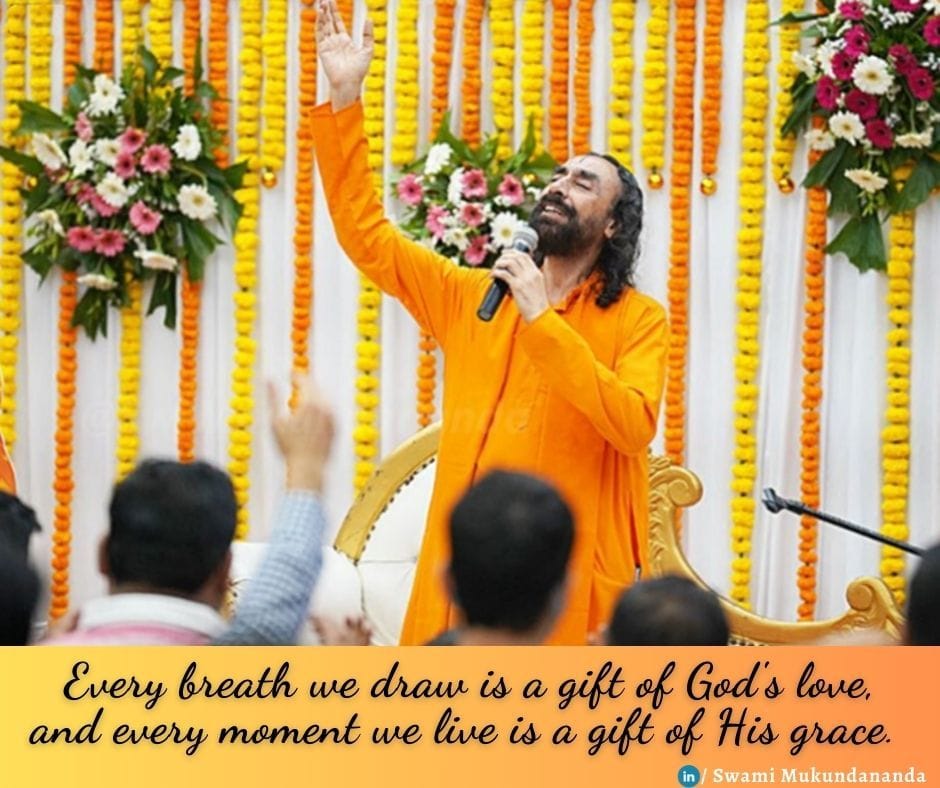A spiritual aspirant’s journey is not devoid of worldly and spiritual challenges. What is important to know is that a proper perspective can enable one to rise above the whirlwind of trials and tribulations. When caught in chaotic situations, many tend to overlook one of the most potent tools for personal transformation and spiritual growth – gratitude. This simple yet profound emotion has the power to reshape our perspectives, elevate our consciousness, and enhance our overall well-being.
As Swami Mukundananda ji beautifully elucidates, gratitude is the absence of vanity. It is a state of being where we recognize and appreciate the myriad blessings bestowed upon us, both universal and special. In this exploration of gratitude, we will delve into its spiritual significance, its impact on our physical and mental health, and practical ways to cultivate this transformative attitude in our daily lives.
The Spiritual Essence of Gratitude
Gratitude, in its purest form, is a recognition of the divine grace that permeates every aspect of our existence. In his commentary on the Bhagavad Gita (Verse 16.3), Swami Mukundananda ji explains that traits like self-praise, boastfulness, and ostentation stem from pride – characteristics common in materially conditioned souls. In contrast, saintly personalities embody gratitude, acknowledging God as the source of their virtues and refraining from self-aggrandizement.

Consider the world around us – the earth beneath our feet, the life-giving sunlight, the air we breathe, and the water that sustains us. These are but a few examples of the countless gifts we have received without an expectation of anything in return. Our very existence is the most precious gift of all. In light of these blessings, cultivating a deep sense of indebtedness to the Divine is not just appropriate; it is essential for spiritual growth.
This sentiment of gratitude forms one of the six fundamental conditions for surrender to God. By maintaining an attitude of thankfulness, we open our hearts to receive more of the Divine's grace and guidance.
Gratitude as a Catalyst for Spiritual Growth
The role of gratitude in spiritual advancement cannot be overstated. It serves as a powerful catalyst, propelling us forward on our spiritual journey in several ways:
- Deepening Our Divine Connection. When we cultivate gratitude, we become more attuned to the divine presence in every moment of our lives. This heightened awareness fosters a profound sense of connection with the Divine, infusing our spiritual practices with greater meaning and depth.
- Nurturing Humility. True gratitude naturally breeds humility. It reminds us that our achievements and blessings are not solely our own doing but the result of divine grace and the support of others. Humility is crucial for spiritual growth, as it helps us transcend the ego – often the biggest obstacle on the spiritual path.
- Enhancing Spiritual Practices. A heart filled with gratitude approaches spiritual practices with sincerity and devotion. The attitude of thankfulness makes our sadhana more effective and transformative, allowing us to derive greater benefits from our efforts.
- Recognizing Life as a Divine Gift. Gratitude helps us to perceive life itself as a precious offering from the Divine. With this perspective, every experience – joyful or challenging – becomes an opportunity for growth and an occasion for thankfulness.
- Strengthening Faith and Trust. Regular practice of gratitude reinforces our faith in the divine plan. As Swami Mukundananda ji teaches, "Gratitude is the foundation of faith. When we are grateful, we trust that the divine is guiding us and that every experience is meant for our growth."

The Science of Gratitude: Impact on Physical and Mental Well-being
While the spiritual benefits of gratitude are profound, its positive effects extend to our physical and mental health as well. Scientific research has begun to uncover the tangible benefits of cultivating a grateful attitude:
- Boosting Mental Health. Studies have shown that individuals who regularly practice gratitude experience fewer symptoms of depression and anxiety. A landmark study by Emmons and McCullough (2003) found that participants who kept a weekly gratitude journal reported feeling better about their lives and were more optimistic about the future compared to those who recorded neutral or negative events.
- Enhancing Physical Health/ Grateful individuals tend to have stronger immune systems, lower blood pressure, and fewer aches and pains. The same study by Emmons and McCullough revealed that people who practiced gratitude took better care of their health, exercised more regularly, and were more likely to attend regular check-ups.
- Increasing Resilience. A study focusing on Vietnam War veterans (Watkins et al., 2008) found that gratitude was positively correlated with several aspects of well-being, including life satisfaction and lower rates of post-traumatic stress disorder symptoms. This suggests that gratitude can be a powerful tool for building resilience in the face of adversity.
- Strengthening Relationships. Expressing gratitude helps foster strong, healthy relationships by promoting mutual respect and appreciation. Research by Lambert et al. (2012) indicated that gratitude leads to enhanced social support and reduced stress, which in turn decreases the risk of depression.
Practical Ways to Cultivate Gratitude
Incorporating gratitude into our daily lives can be transformative. Here are some practical tips to help you develop a consistent gratitude practice:
- Keep a Gratitude Journal. Take a few moments each day to write down things you're grateful for. This simple act can shift your focus towards the positive aspects of life.
- Express Gratitude to Others. Make it a habit to thank the people in your life who have made a difference. A heartfelt note or a sincere conversation can strengthen relationships and spread positivity.
- Practice Mindfulness. Engage in mindfulness meditation to become more aware of the present moment and appreciate the beauty around you. This awareness can enhance your sense of gratitude.
- Reframe Challenges. Instead of dwelling on difficulties, try to see them as opportunities for growth. Reflect on what you've learned from challenging situations and how they have shaped you.
- Volunteer and Give Back. Helping others can foster a sense of gratitude by reminding us of the blessings in our own lives. Volunteering your time and resources can create a positive feedback loop of giving and receiving. Additionally, if one volunteers for a spiritual organization, the actions represent Seva - an expression of devotion to the Divine.
Individuals seeking opportunities for spiritual Seva may connect with JKYog. It offers numerous incredible opportunities to aspirants around the world to enable them to utilize their time to be good, do good, and feel good under the guidance of highly committed mentors.

Conclusion: Embracing Gratitude as a Way of Life
In conclusion, let us remember that gratitude is more than just a fleeting feeling – it is a transformative force that can reshape our entire approach to life. By cultivating an attitude of gratitude, we open ourselves to a world of spiritual growth, improved well-being, and deeper connections with both the Divine and those around us.
Let us take inspiration from the teachings of Swami Mukundananda ji and strive to incorporate gratitude into every aspect of our lives. As we embark on this journey of thankfulness, may we remember that every breath, every heartbeat, and every moment is a gift. In recognizing and appreciating these blessings, we not only enrich our own lives but also become beacons of positivity and spiritual growth for the world around us.
Let gratitude be the light that guides us on our spiritual path, illuminating the way to a life of fulfillment, joy, and profound connection with the Divine. With this thought, we express our deepest gratitude to our Divine Guru who makes this life worth living.

Resources:
- Life-Changing Power of Positive Mindset and Gratitude on your Brain | Swami Mukundananda
- Count Your Blessings and Feel Grateful | Positivity | Happiness Challenge Day 3 | Swami Mukundananda
- Meditation Day 2 | Meditate on Cultivating Gratitude Towards God | Get Closer To God 21 Day Challenge
- How to Cultivate an Attitude of Gratitude? | #iFeelGratitude | Spirit of Gratitude
- Gratitude For God and Seeing Everything Belonging to God | Part 4 and 5 - 6 Conditions for Surrender

